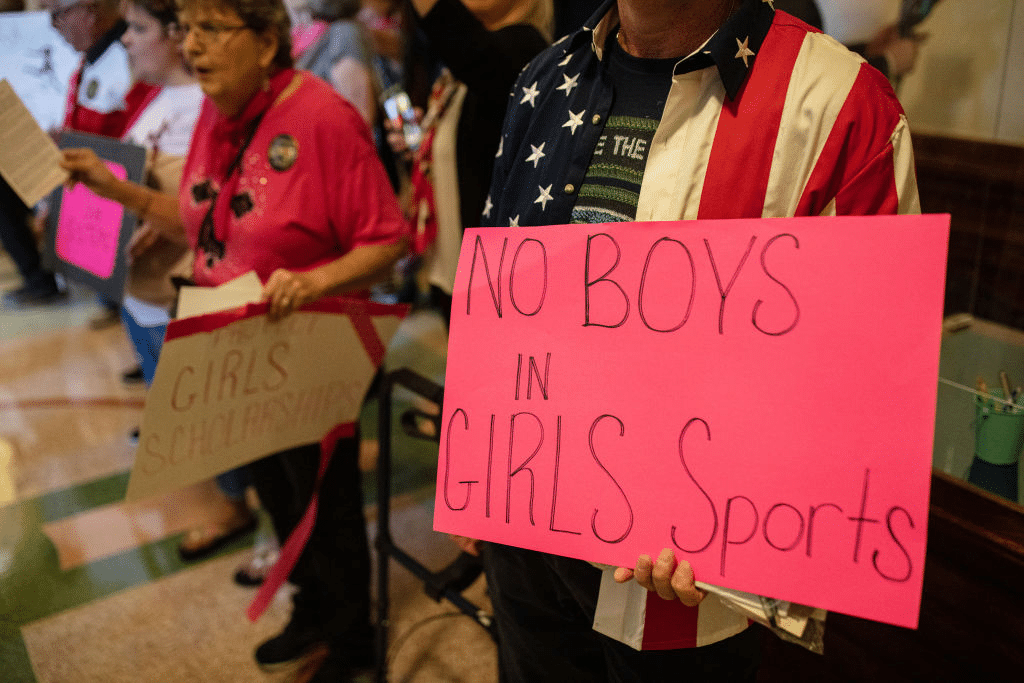
Best Way to Change Trans Policies in Sports? Women Refuse to Play
As more youth experience gender confusion and join athletics, in the name of political correctness sports associations often allow males who “identify” as females to compete alongside females. These male athletes then beat the female athletes because of their physiological advantages.
If sports associations won’t change their policies to make the playing field level again, the best course of action for now is for females to refuse to play.
This happened recently in the world of martial arts. The North American Grappling Association, known as NAGA, changed its policies and again will separate males and females after several females refused to compete against fighters who “identify” as women, saying they were afraid of the strength of these males.
During a NAGA tournament in Georgia on Oct. 21, several female martial artists were pitted against men who say they identify as women. One male, Corissa Griffith, won four gold medals in the women’s category that day. Another male, Cordelia Gregory, took second place in the women’s category.
It appears that no protocol existed for excluding male athletes who identify as female, based on testosterone levels or anything else. To compete, these athletes simply could say they are female on registration forms for NAGA tournaments.
On a social media account, Jayden Alexander explained that she refuses to compete in the North American Grappling Association’s jiu-jitsu events because after competing in July against a male athlete who identifies as female, the experience left her in tears. To prove it, Alexander posted photos of her competing against an obviously larger and stronger male.
“The experience was horrible and scary … I was absolutely in fight-or-flight mode,” Alexander said in a video posted on Instagram. “We don’t deserve to self-exclude from competitions to avoid fighting men. We deserve for there to be rules and regulations put into place that keep us safe and that protect us from these situations happening in the first place.”
In September, Taelor Moore, a 135-pound woman, posted a video on Instagram showing her grappling with a 200-pound male athlete who identifies as a woman.
“My biggest opponent yet,” Moore wrote of that match at a NAGA tournament.
Incredibly, Moore won the match anyway. However, her coach, Jimmy Witt, told Breitbart that Moore “could have been severely injured.”
Her opponent, James McPike, 29, recently began going by the name “Alice” and wound up winning the silver medal Sept. 9 at NAGA’s Grappling Championship in California (after defeating another female, not Moore).
After posting her video, Moore, who had hugged McPike after winning the match, was smeared online by critics who claimed she opened up McPike to “transphobia” simply by doing so.
Moore’s coach argued that if the athlete endured such an unfair match, the least she should be able to do is talk about the experience.
In September, NAGA’s policy was that the organization didn’t require women to compete against males who identify as females. But now, after these issues arose and after women began to refuse to compete, the organization was forced to revise its rules Oct. 28 to ensure fair play for women.
“We will have divisions for only biological females. Transgender females will not be entered into these divisions,” a NAGA statement reads. “Transgender females must compete in the men’s division. We hope that the simplicity of this revised policy will help to avoid any future occurrences where transgender females enter women divisions.”
At a recent high school field hockey match in Massachusetts, a male student who said he “identifies” as a female injured a young woman playing for the opposing team. She was hospitalized. Under the Massachusetts Equal Rights Act, the male player was allowed to compete with and against females.
The captain of the girls team whose player was injured wrote a letter to the Mid-America Intercollegiate Athletics Association that decried policies that allow males who say they identify as females to compete against females. The safety of other players is a huge concern, although there are others, the captain wrote.
Dozens of American sports associations have had to address this debate. At first, it seemed that males who “identify” as female could compete against females in any sport at any time. But in the past year, several governing bodies have revised those policies because of a severe backlash from female athletes and their supporters.
Last year, the NCAA revised its policy to say that each sport could make its own rules for participation.
After a male who said he identified as female won last year’s Tour of the Gila, a cycling stage race in New Mexico, the International Cycling Union decided this year that it would ban any male who has undergone puberty from competing in the women’s category.
The World Athletics Council this year adopted the same rules for track as it did for swimming last year. Athletes who have “transitioned” from male to female and gone through male puberty are banned from competing as women.
Besides a court challenge, which some female athletes have pursued, forcing a sports association to revise its rules on fair play by refusing to participate at all is the best possible way to ensure that females face fair competition and remain as safe as possible.
It’s unfortunate that some women missed out on sports tournaments under previous policies, which allowed unfair competition. But quitting temporarily, as in the case of the North American Grappling Association, paid off in the long run.
NAGA’s much-needed revision of policy is also proof that media coverage performs a necessary good by exposing the unfairness of these policies or highlighting social media posts that expose what really happens when post-puberty males compete against females.
To many progressives, on paper, policies that allow male athletes who say they identify as female to compete against females sound like inclusion and a way to promote fairness. But in reality, such policies hurt females’ safety, privacy, and opportunity to participate in a fair competition.



